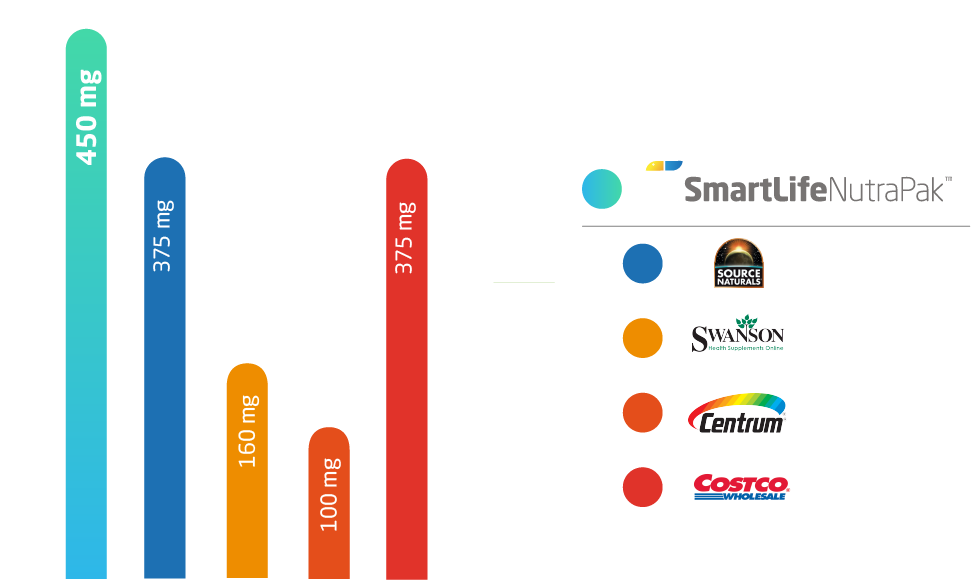WHAT MAKES OUR NUTRAPAK DIFFERENT
High quality ingredients, plus bioavailability, best personalization at DNA level and real-time vitals data, equaling into your body getting the best possible nutrition.
VITAMIN A
Vitamin A is a group of unsaturated nutritional organic compounds that includes retinol, retinal, retinoic acid, and several provitamin A carotenoids (most notably beta-carotene).Vitamin A has multiple functions: it is important for growth and development, for the maintenance of the immune system and good vision.It’s needed by the retina of the eye in the form of retinal, which combines with protein opsin to form rhodopsin, the light-absorbing molecule necessary for both low-light (scotopic vision) and color vision.
WHAT FOODS CAN YOU EAT TO OBTAIN VITAMIN A1?
It can be found in foods like carrots, sweet potatoes, kale, berries, eggs, butter, and organ meats like beef or chicken liver.
HOW DOES OUR VALUE COMPARE?
Unlike our competitors, our Medical Advisory Board chose to use 5,000 IU of Vitamin A.
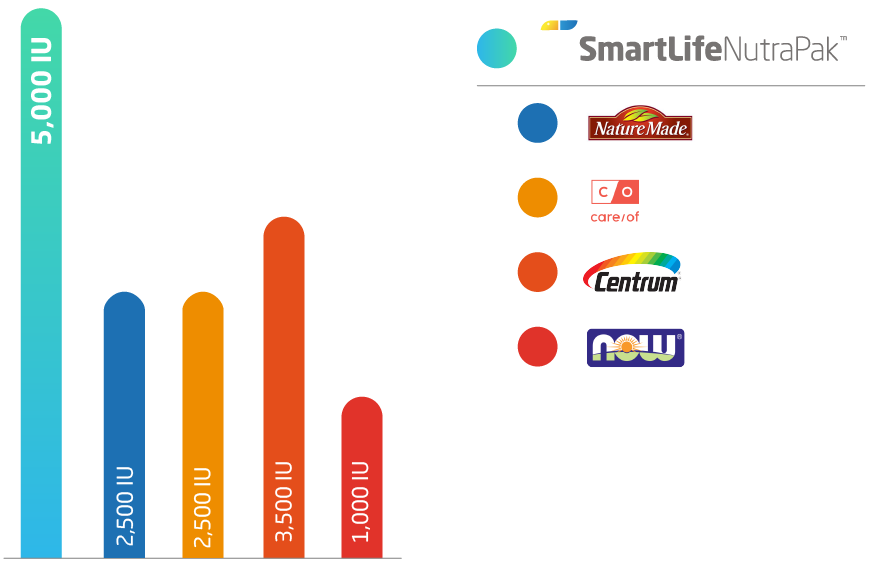
VITAMIN B1
Also known as Thiamin, this vitamin plays an essential role in energy production by helping your body produce ATP (the fuel your body runs on). It is also essential for jump-starting a hormone named acetyl choline that makes your muscles contract and move. This includes your heart muscle. Thiamin also helps prevent nerve damage.
WHAT FOODS CAN YOU EAT TO OBTAIN VITAMIN B1?
It can be found in foods like sunflower seeds, soybeans, nuts, and brown rice.
HOW DOES OUR VALUE COMPARE?
Unlike our competitors, our Medical Advisory Board chose to use 100 mg of thiamin. Smoking, alcohol and stress all deplete this vitamin and we want to offer safe and beneficial levels for remarkable health.
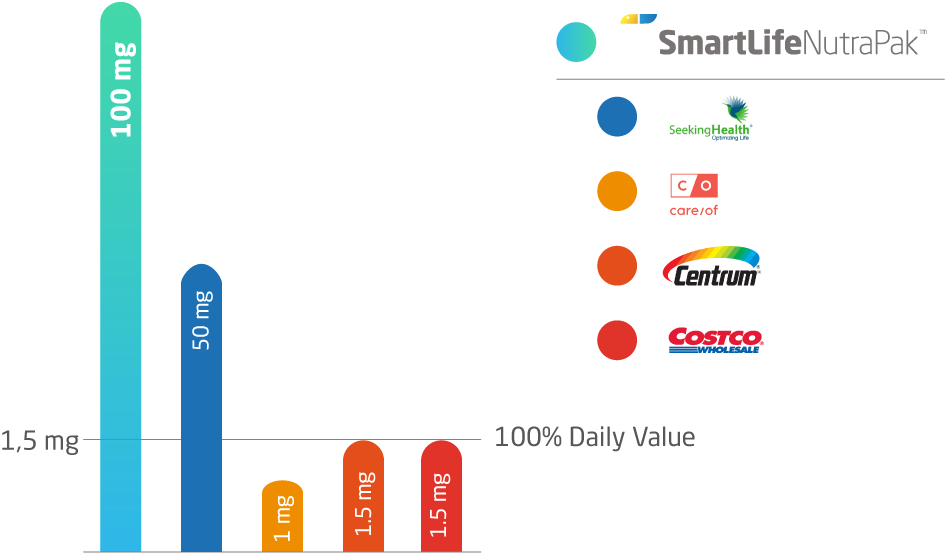
VITAMIN B3
Vitamin B3 or Niacin is a vitamin that includes three forms: nicotinamide (niacinamide), niacin (nicotinic acid), and nicotinamide riboside. All three forms of vitamin B3 are converted within the body to nicotinamide adenine dinucleotide (NAD). NAD is required for human life and people are unable to make it within their bodies without one of the vitamin B3 or tryptophan. It’s also important for helping maintain healthy skin.
WHAT FOODS CAN YOU EAT TO OBTAIN VITAMIN B3?
Niacin is obtained in the diet from a variety of whole and processed foods, with highest contents in fortified packaged foods, chicken breast, canned light tuna, mackeral, salmon and some vegetables.
HOW DOES OUR VALUE COMPARE?
SmartLIFENutraPak™ contains naturally sourced B3. We offer 250 mg to support body health functions.
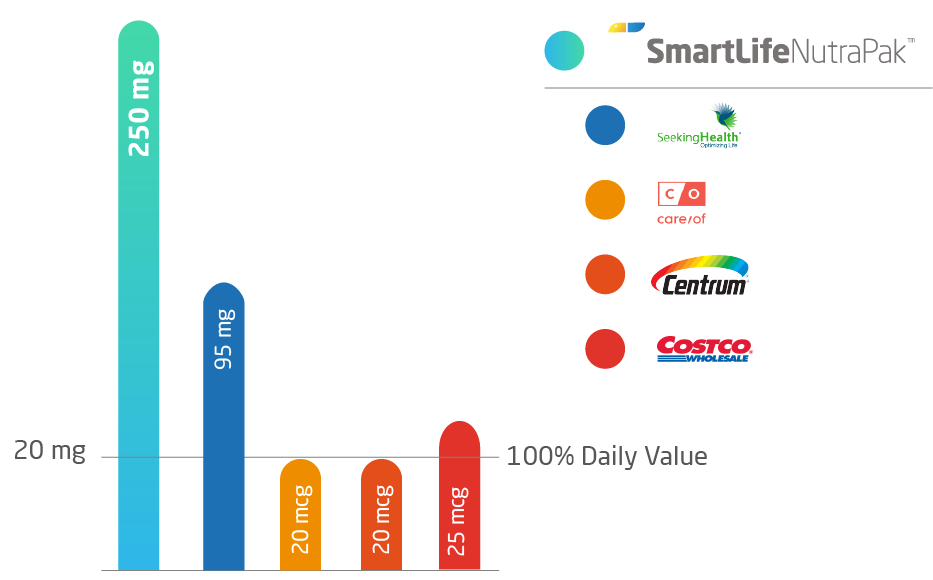
VITAMIN B6
Vitamin B6 is vital for mood regulation and neurotransmitter function. It is important for synthesis of GABA, serotonin, histamine and dopamine. Vitamin B6 supports the immune system as well as memory. It also protects the heart and kidneys so that they can function properly.
WHAT FOODS CAN YOU EAT TO OBTAIN VITAMIN B6?
You can get vitamin B6 from meat, nuts, beans, grains, bananas, potatoes, whole wheat, brussel sprouts, and cauliflower.
HOW DOES OUR VALUE COMPARE?
The active and more absorbable form of vitamin B-6, pyridoxal-5-phosphate, is shown to help support mood, brain function and cardiovascular health without unwanted interactions.
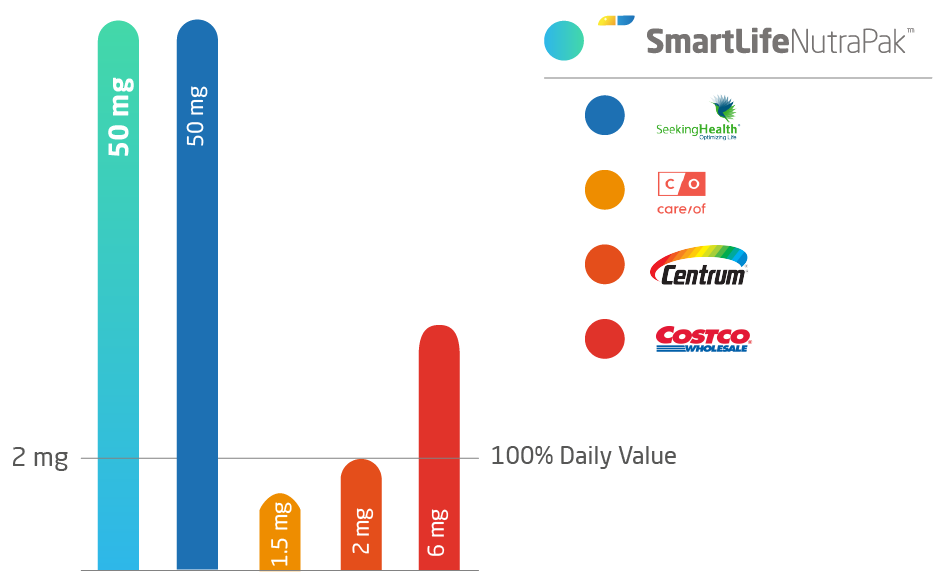
VITAMIN B12
Vitamin B12 plays an essential role in cellular energy production, immune system support and nerve function. It is also essential for the reduction of homocysteine in the body. Excess homocysteine may lead to ailments like arthrosclerosis and osteoporosis.
WHAT FOODS CAN YOU EAT TO OBTAIN VITAMIN B6?
Vitamin B12 is generally only found in animal sourced foods such as liver, cheese, fish, clams, and eggs.
HOW DOES OUR VALUE COMPARE?
Our Medical Advisory Board chose to use therapeutic levels of B12 in our NutraPak because it has numerous benefits when taken in higher doses including improvement of anemia, depression, memory and amino acid regulation.
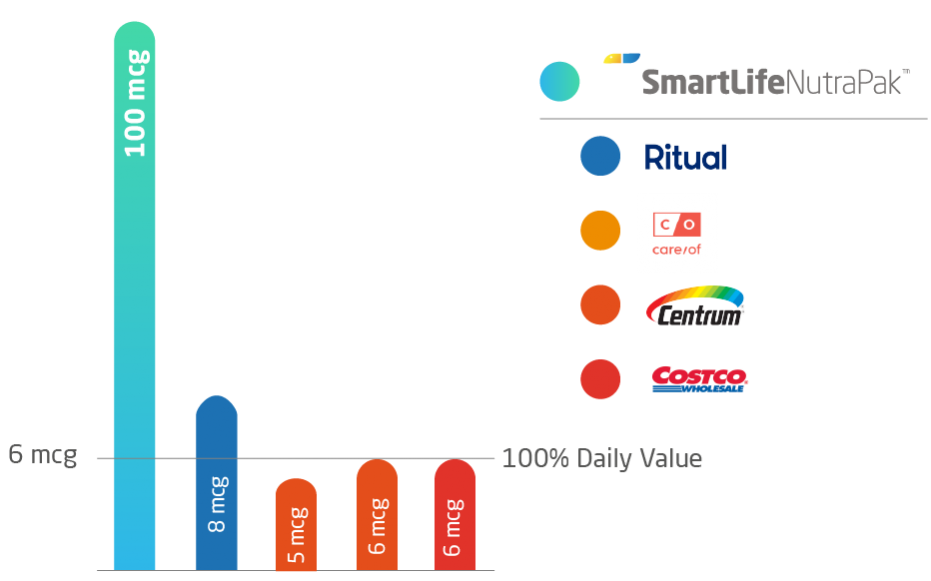
VITAMIN B5
Vitamin B5, also known as pantothenic acid, is a water-soluble vitamin that is found in all living cells within the body. Studies have shown that there are plenty of important B5 vitamin roles within the body, such as converting nutrients from food into energy, balancing blood sugar, reducing bad cholesterol, lowering high blood pressure, preventing nerve damage and pain, and preventing heart failure.
WHAT FOODS CAN YOU EAT TO OBTAIN VITAMIN B5?
Content of pantothenic acid varies among manufactured and natural foods. Major food sources of pantothenic acid are dried mushrooms, liver, dried egg yolks and sunflower seeds.
HOW DOES OUR VALUE COMPARE?
Our SmartLifeNutraPak™ contains vitamin B5. We offer 45 mg because it helps support to prevent heart failure and nerve damage.
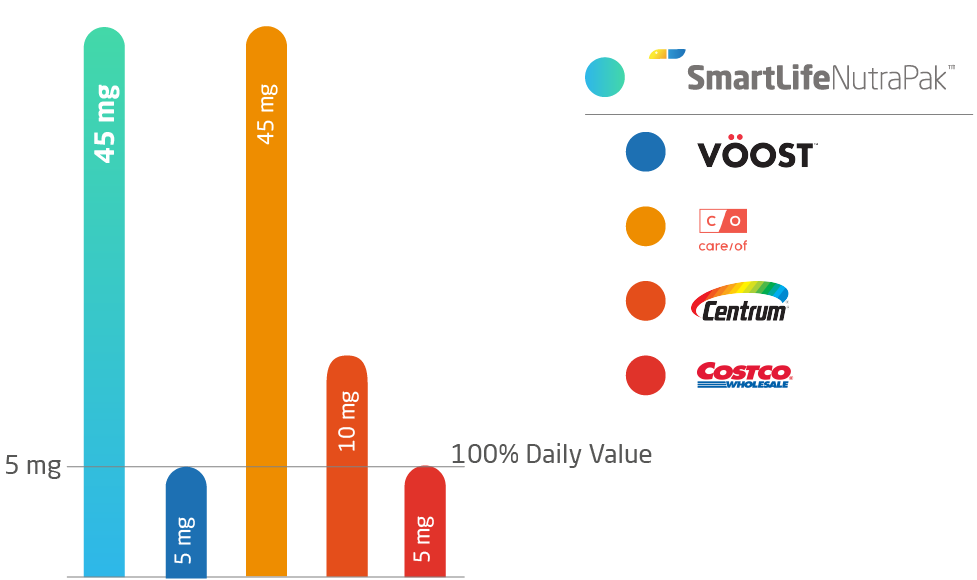
VITAMIN D3
Vitamin D3 is the common name for cholecalciferol. It can be taken as a supplement to improve overall health or used to treat osteoporosis. It can also be used to treat conditions in which vitamin D3 levels may be low, such as in people who have underactive parathyroid glands, low levels of phosphate in the blood, or hereditary conditions in which the body doesn’t respond to the parathyroid hormone.
WHAT FOODS CAN YOU EAT TO OBTAIN VITAMIN D3?
It is naturally present in very few foods, like oily fish, salmon, codfish, mackerel, and blue fish. It is also produced endogenously when ultraviolet rays from sunlight strike the skin and trigger vitamin D synthesis.
HOW DOES OUR VALUE COMPARE?
Our NutraPak™ contains 5,000 IU to supply to the reduced vitamins absorption from food.
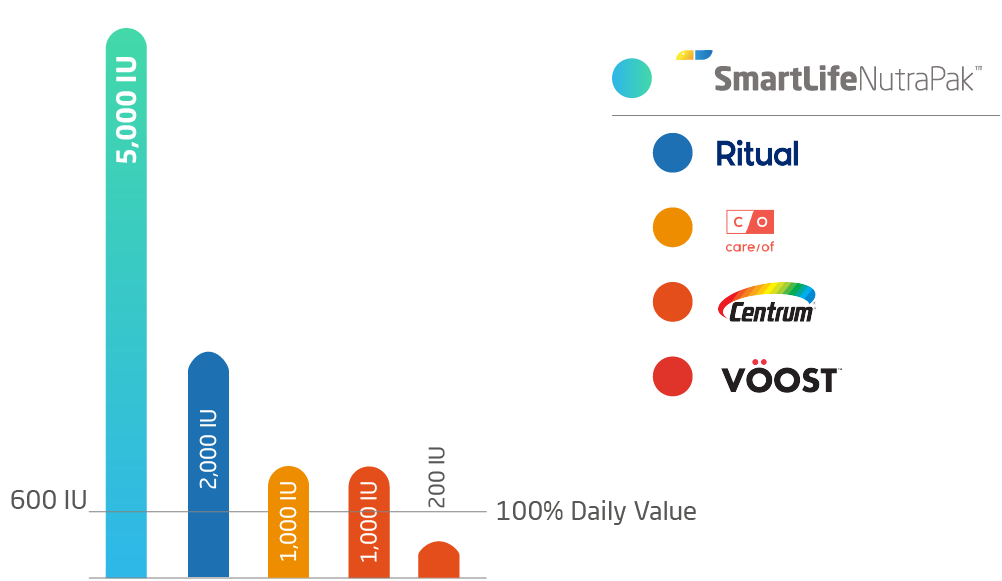
VITAMIN K2
Did you know, up to 80% of people are deficient in K2? That’s a big oversight—vitamin K2 helps reduce blood clots, which can lead to stroke. It’s also great for bone health and formation. Your cardiovascular system also benefits from K2—it protects arteries and blood vessels while clearing out plaque and calcium deposits.
WHAT FOODS CAN YOU EAT TO OBTAIN VITAMIN K?
You can get vitamin K1 from broccoli, lettuce, spinach, green tea and dark, leafy vegetables. K2 is in natto, hard cheese, butter and chicken breast.
HOW DOES OUR VALUE COMPARE?
Our NutraPak™ contains naturally sourced K2. Up to 80% of people are deficient in K2. We offer 100 mcg because it helps support (or maintain) artery and bone health at these levels.
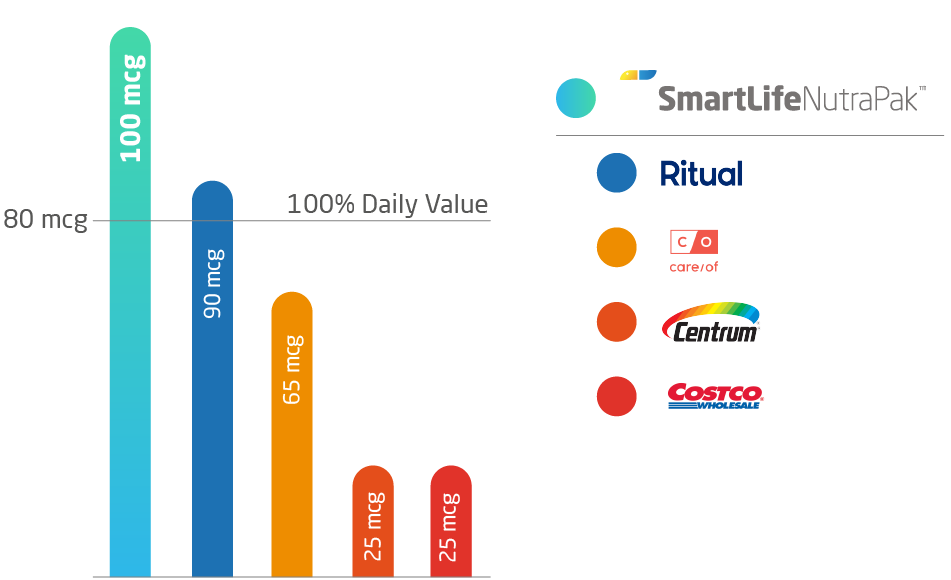
FOLATE
Folate, in the form of folic acid is used to treat anemia caused by folic acid deficiency and also used as a supplement by women during pregnancy to prevent neural tube defects (NTD) in the baby. Low levels in early pregnancy are believed to be the cause of more than half of babies born with neural tube defects. Long term supplementation is also associated with small reductions in the risk of stroke and cardiovascular disease.
WHAT FOODS CAN YOU EAT TO OBTAIN FOLATE?
You can get Folate from dark green leaf vegetables such as Brussels sprouts, curly kale, spinach; in other vegetables including asparagus, boiled fresh beetroot, lettuce and red bell peppers; in some fruits such as strawberries, many legumes, many nuts grains and other seeds. Some meat, especially liver and kidneys, eggs, and some seafood.
HOW DOES OUR VALUE COMPARE?
Our NutraPak™ contains up to 1,000 mcg of Folate.
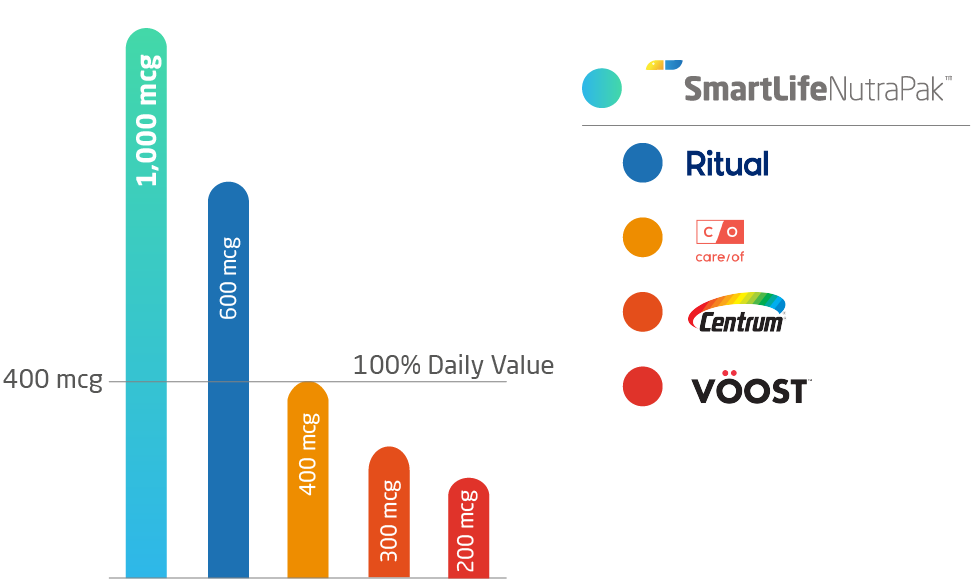
BIOTIN
Biotin is an important component of enzymes involved in metabolizing fats and carbohydrates, influencing cell growth, and affecting amino acids involved in protein synthesis. It assists in various metabolic reactions involving the transfer of carbon dioxide. It may also be helpful in maintaining a steady blood sugar level. It is often recommended as a dietary supplement for strengthening hair and nails, though scientific data supporting these outcomes are weak.
WHAT FOODS CAN YOU EAT TO OBTAIN BIOTIN?
Liver and other meats, Egg yolk, Yeast, Nuts and seeds, Salmon, Dairy, Avocados, Sweet potato, Cauliflower
HOW DOES OUR VALUE COMPARE?
Our NutraPak™ contains naturally sourced Biotin. We offer 5,000 mcg because it maintain body health at good levels.
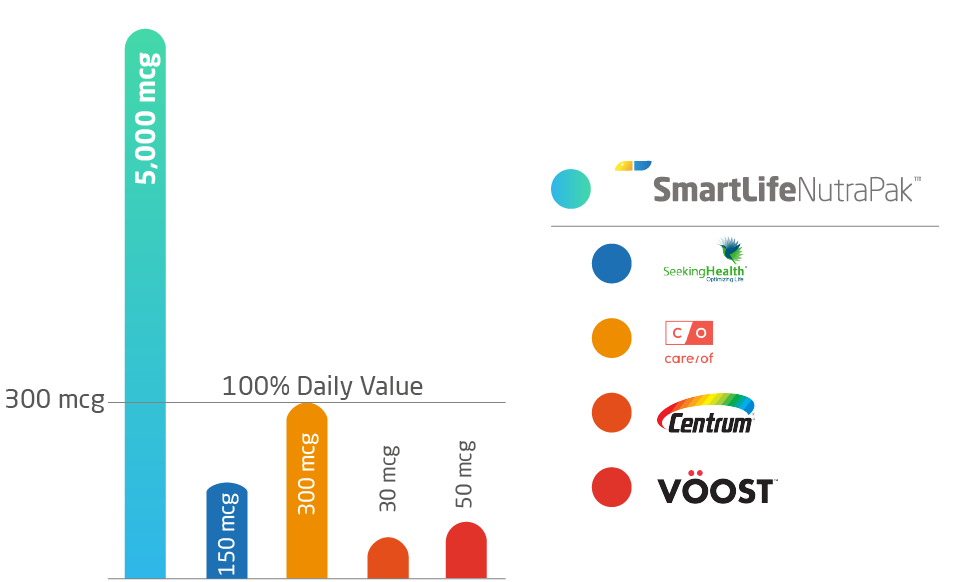
MELATONIN
Melatonin is a hormone that is produced by the pineal gland in humans and animals and regulates sleep and wakefulness. Melatonin is also produced in plants where it functions as a first line of defense against oxidative stress.
WHAT FOODS CAN YOU EAT TO OBTAIN MELATONIN?
You can get melatonin from tart cherries, bananas, oats, pineapples and tomatoes.
HOW DOES OUR VALUE COMPARE?
Our SmartLifeNutraPak offers up to 5 mg, more than other competitor supplements.
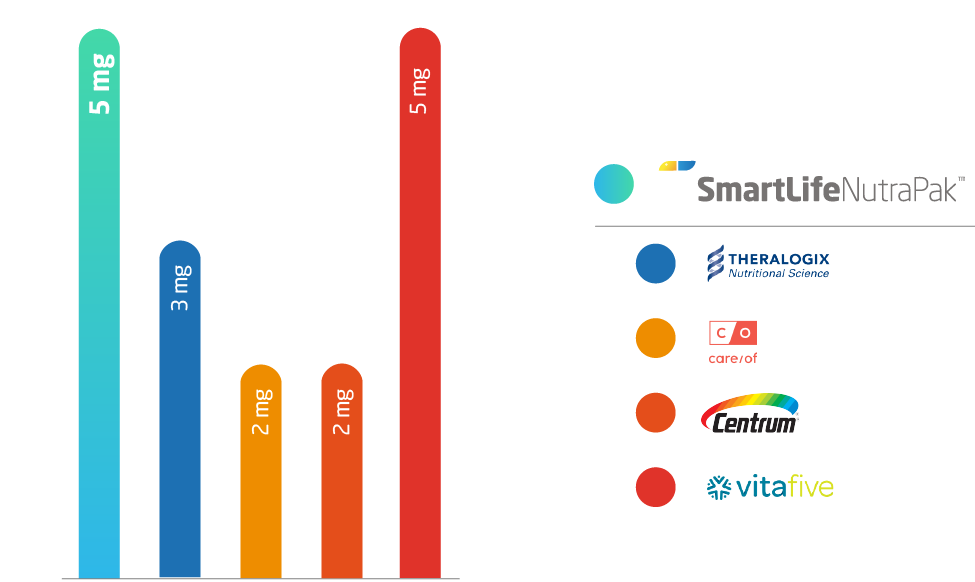
SITOSTEROL (PLANT STEROL COMPLEX)
Beta-sitosterol is used for heart disease and high cholesterol. It is also used for boosting the immune system and for preventing colon cancer, as well as for gallstones, the common cold and flu, HIV/AIDS, rheumatoid arthritis, tuberculosis, psoriasis, allergies, cervical cancer, fibromyalgia, systemic lupus erythematosus (SLE), asthma, hair loss, bronchitis, migraine headache, and chronic fatigue syndrome.
WHAT FOODS CAN YOU EAT TO OBTAIN SITOSTEROL?
Sitosterol is founds in plants, fruits, vegetables, nuts, and seeds. It is widely distributed in the plant kingdom and found in vegetable oil, nuts, avocados and prepared foods, such as salad dressings
HOW DOES OUR VALUE COMPARE?
SmartLifeNutraPak™ contains sitosterol from natural sources. We offer 450 mg because it helps your immune system.
